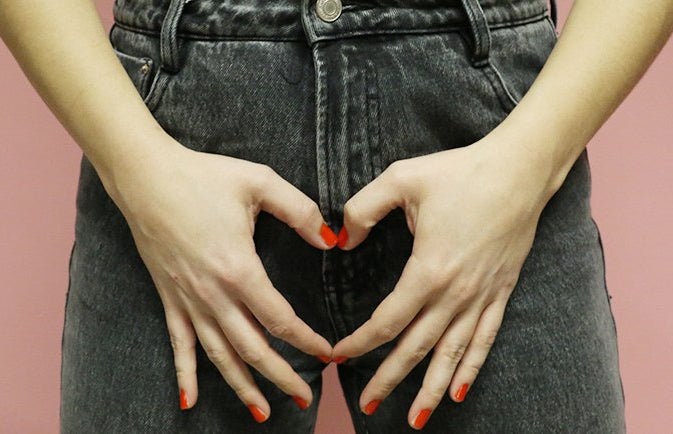When I walk down the feminine care aisle, I get bewildered. The products and marketing are telling me that I should use special soap or cleanser for my vagina and vulva, that it needs to smell like lavender, or that they’re dirty without this specific soap and need cleaning. But I don’t think my vagina is dirty, so why would I need to clean it? I used a vaginal wash for years and liked it. I didn’t have any significant side effects, and I liked the thought that I was cleaning my vulva. But my social media was telling me otherwise. On my TikTok for-you-page, I had creators telling me their pre-sex hygiene routine and all the things they put on their vulva, which made me start to think that I wasn’t doing enough for my feminine hygiene. So, it got me thinking, should I use a vaginal wash?
What social media has taught me
As the accessibility of social media grows, and the conversation around sexual health becomes more open, women have access to information they might have never had before, including a growing sense of feminine care. I mention TikTok often in my articles, partly because I’m on it every day and I get lots of article ideas from it, and partly because it does offer some helpful information, as long as that is accurate. Several TikTok gynecologists and obstetricians have acquired a growing social media following, dedicated to educating women on feminine genital care and eliminating stigmas associated with talking about feminine hygiene. @drjenniferlicocln, a verified OB/GYN on TikTok, and @alirodmd, who is also an OB/GYN, are both super helpful resources to look toward. I’ve researched them heavily, and they don’t share misinformation (at least to what I can see).
Dr. Jennifer Lincoln says in several of her videos that the vagina doesn’t need cleaning – not before sex, not after sex, not ever – because it is a self-cleaning organ. She says that feminine care products targeted for your vagina, like Summer’s Eve and Vagisil, should never be used because the vagina cleans itself in the form of discharge. Instead, your vulva is the part of you that you should clean. This TikTok from Dr. Lincoln is a helpful demonstration of the mechanics of cleaning your vulva. She suggests that water is enough, or a gentle, fragrance-free cleanser is appropriate for such a sensitive area. She does not recommend wipes either because they’re too harsh on the delicate skin of the vulva, and deodorants are simply not needed down there either. Some gentle cleansers she suggests are Cetaphil, Dove, or Eucerin. The most important thing is that the cleanser you use is unscented and not harsh for sensitive skin. Dr. Lincoln also suggests not using a scented shaving cream if you plan on shaving your vulva either (Did this just make me throw out my scented shaving cream? Maybe).
The natural vagina
Infections are also a significant concern when considering using a vaginal wash. An article from the Journal of Women’s Health says, “The normal vaginal flora, acidic vaginal pH, and vaginal discharge are all components of the innate defense mechanisms that protect against vulvovaginal infections.” According to the National Health Service (NHS), there are lots of healthy bacteria in the vaginas and vulvas that help balance your pH without the unnecessary help of soaps and cleansers. So, by using vaginal washes, you wash all those healthy bacteria away, which can cause more issues like vaginal dryness and irritation and leave you open to infection. OASH, the office on women’s health, also strongly discourages douches, which involves cleaning the inside of the vagina. Because it washes away all the bacteria in the vagina, unbalancing the pH, it’s not good for vaginal health.
Vaginas have a natural scent to them. They aren’t supposed to smell like roses or lavender. The usual scent is muskiness, but it shouldn’t smell foul or strong. If it does, the NHS recommends seeing your doctor as it may be a symptom of a more severe issue, like a UTI. So, just because your vagina has a smell to her doesn’t mean you need to use soaps.
My experience with washes
I was an avid vaginal wash user for years. I used the Sensitive Feminine Wash from The Honey Pot. I liked it because it is vegan and cruelty-free, it is unscented, and its main ingredient is apple cider vinegar. It’s advertised to “boost moisture level and balance your pH.” I liked the idea of cleaning my vagina, especially around my period. I just felt fresher. But the beauty of the vagina and all the excellent discharge it creates is that you’re not supposed to clean that out.
However, I started to change my mind after I got my first urinary tract infection (UTI), which is caused by bacteria getting into your urethra and making its way into your bladder and urinary tract. They can be quite painful and, left untreated, can cause significant issues and develop into a kidney infection. After my first one, I wanted to prevent getting them in the future. They occur, usually, after not peeing after sex or from wiping incorrectly after using the bathroom. But I found out that using a vaginal wash can exacerbate a UTI. According to the Mayo Clinic, irritating feminine or vaginal products can irritate the urethra. If you’re prone to UTIs, like I am, not using them can help prevent infection.
So, I stopped using mine completely. Instead, I just use water and a gentle body wash on the rest of my body. Truthfully, I haven’t noticed a difference.
So, to answer the question I posed at the beginning of this article, no, you maybe shouldn’t be using a vaginal wash. Most of the products tell you that your vagina is dirty, but it’s not. Unless there is a medical condition to do otherwise, your vagina smells and behaves like it’s supposed to. If you use a vaginal wash and like it and haven’t had any side effects, go for it. But you won’t catch me using anything on my vulva except water.


